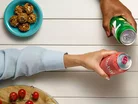PepsiCo to reduce added sugar for healthier products

As many seek to lose the lockdown-weight, PepsiCo, best known for its fizzy drink, has declared that it will expand its healthier snacks and beverage portfolio across Europe.
This plan will involve:
- A reduction of the average level of added sugars in its beverage portfolio by 25% by 2025
- A 50% reduction by 2030
- Scaling up its snacks portfolio, rated Nutri-Score B or better
- Making this a $1b portfolio by 2030.
PepsiCo has already made progress over the past decade to reduce added sugars in beverages and sodium and saturated fat in foods, to introduce smaller portion sizes and to create alternatives of existing brands with improved nutritional profiles, like Pepsi MAX, 7UP Free and Lay’s Oven Baked.
The same PepsiCo products, with new health goals
The plan involves a series of commitments based on rigorous science-based nutrition guidelines and a plan will be submitted to the European Commission as a part of its Code of Conduct for Responsible Business and Marketing Practices.
The new goals will be achieved through reformulation of existing products, expanding the company’s existing brands, including Lay’s Oven Baked, to more markets, and introducing new snacking ranges such as PopWorks, its newly launched popped corn crisps range.
In addition, the sugar reduction also has a positive climate impact. The company estimates that moving from full sugar to sugar-free formulations reduces up to a quarter of the greenhouse gas emissions from a beverage.
PepsiCo becomes a healthier and more sustainable brand
PepsiCo has also stepped up its goals to tackle climate change, committing to net zero by 2040 and a 40% reduction in greenhouse gas emissions (GHGs) by 2030, while also scaling regenerative agriculture across its entire agricultural footprint, reducing GHGs by 3 million tons by 2030.
“Consumers want healthier and more sustainable brands, and they want products that taste great”, said Silviu Popovici, Chief Executive Officer, PepsiCo Europe. “Over the past decade, we’ve reformulated and launched new products to bring more options to consumers. As a result, in Europe today, almost one in three beverages we sell is sugar-free and we believe this trend will continue to grow over time. With this pledge, we can use our experience with sugar reduction to accelerate our shift to a healthier snacks portfolio.”
The company has also aligned to UNESDA (the European soft drinks industry association) and the World Federation of Advertisers (EU Pledge) commitments around no marketing or advertising to children under 13.
Since 2006, PepsiCo has not advertised its soft drinks to under 12s across Europe and it has applied science-based nutrition criteria to determine which food products it can advertise to under 12s.



